Yesterday was an unusual one for me and [[Catherine]]: [[Oliver]] was off with Derrick camping and Cloggerooing and so we were left to our own devices as a couple. It was like 1998 all over again.
Sitting in the living room after breakfast we tried to come up with a plan for the day.
“Should we just go to work?”, asked Catherine.
That was a trick question. I knew it.
“No, of course not!”, I replied.
Which was the desired response.
And so we bundled our towels and swimsuits and beach chairs into the recently-air-conditioning-free Jetta (my mechanic reported last week that the AC was shot, and the repairs would likely bankrupt me) and headed west.
We stopped for lunch at Scapes in Borden-Carleton (fish cakes and salad; fantastic) and for iced coffee at Samuel’s in Summerside, thus recreating a trip that Oliver and I took earlier in the summer.
But when we got to Kensington, instead of heading back to town, we took the Malpeque turn instead, and headed for Cabot Beach Provincial Park, the hour – about 3:30 p.m. – being appropriate for a swim, especially after driving around all day in a car cooled only by the open windows blowing hot air over us.
I am not a natural beach goer. The logistics of a day at the beach, combined with a general unease with sand, and a vague underlying jellyfish phobia mean that while I’m not completely beach-averse, I won’t put my hand up when there’s a call for beach volunteers.
But yesterday, if there was ever a day to get over all that, was the day. And so I did.

We spent a very pleasant few hours at the beach, alternating between paddling about in the shallow, cool, low tide water and staring out at the shallow, cool, low tide water. It was the perfect antidote to the summer heat, and made me wonder why I don’t go to the beach every day.
Heading out of Cabot Beach toward Malpeque, we mused about where we should have supper. We’d been to all the usual suspects this summer, and nothing jumped out at us.
“Maybe we should just go home?”, Catherine suggested.
That was a trick question. I knew it.
No sooner were to the words out of her mouth than I spotted a sandwich board in downtown Malpeque: Artisan Café, with an arrow pointing east.
I turned east.
And there, 50 feet from the sign, was O’Neil Home Gallery, still open, and serving food on what looked like a breezy, cool porch.
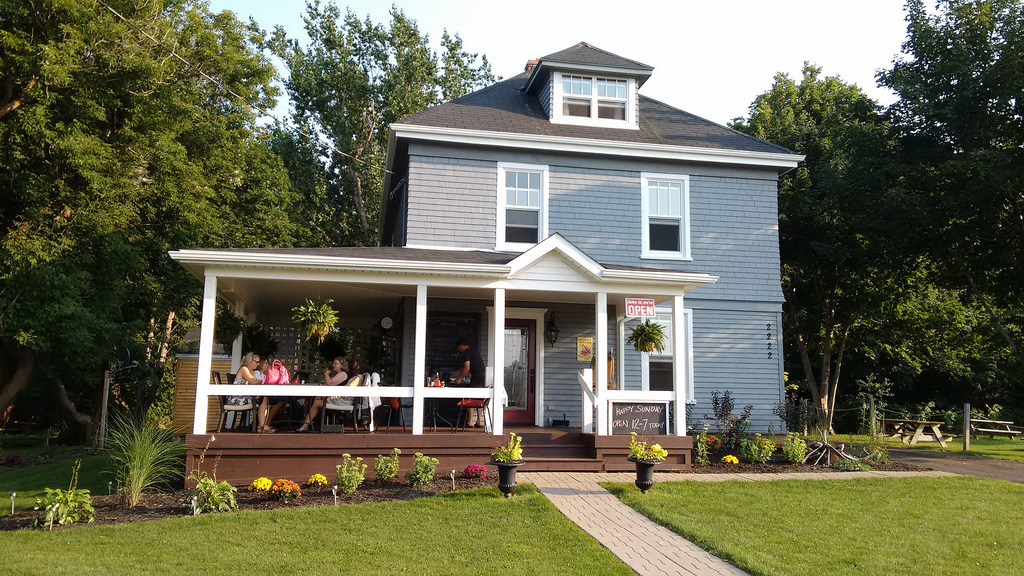
It was as if the fates conspired to drop exactly the thing we were looking for exactly into the space we were looking for it to be in.
We alighted the breezy porch and I knew we were in the right place when, upon my asking “do you have iced tea?”, our server replied “well, I can certainly make you one”, emerging a few moments later with this:
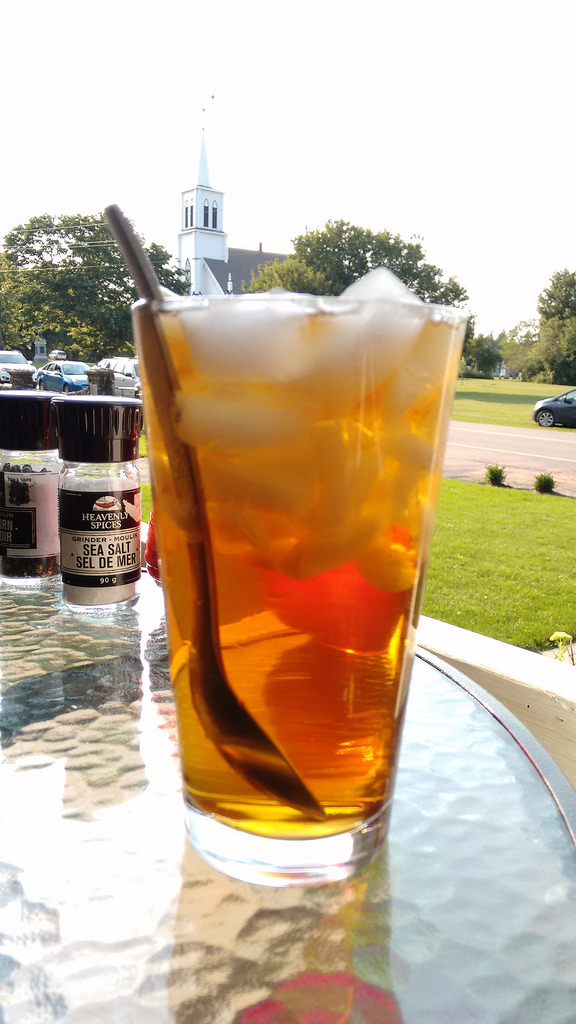
We then enjoyed a tasty meal: Catherine had a substantial lobster roll, and I had the gnocchi with pesto accompanied by a salad.
Thus sated, we motored off back home, stopped at the PEI Preserve Company for dessert en route.
We arrived home about 8:00 p.m. and about an hour later our very tired [[Oliver]] arrived home from his weekend in the sun.
A good time was had by all.
Back in June I spoke about open data to the Queen’s Printers Association of Canada, and the occasion reintroduced me the notion that perhaps chief among the roles of Canada’s Queen’s Printers is the publication of the Royal Gazette in their province or territory. While many of the Queen’s Printers don’t even print anything any longer – in house – they all remain publishers of this collection of administrativia in their jurisdictions.
While the Prince Edward Island Royal Gazette has been online for many years, it’s still possible to subscribe to it in print, and I felt duty-bound, upon learning this, to take out a subscription.
It’s the best deal in town: $65 for a year of weekly issues. And for someone like me, constitutionally unable to consume information from the screen, it’s the perfect vehicle for learning about the minutiae of the province — incorporations, dissolutions, changes of name, tax sales, and more.
My first issue arrived in the mail today, dated August 15, 2015. It’s not available online (yet), something that offends my open data sensibilities by delights my print ones.
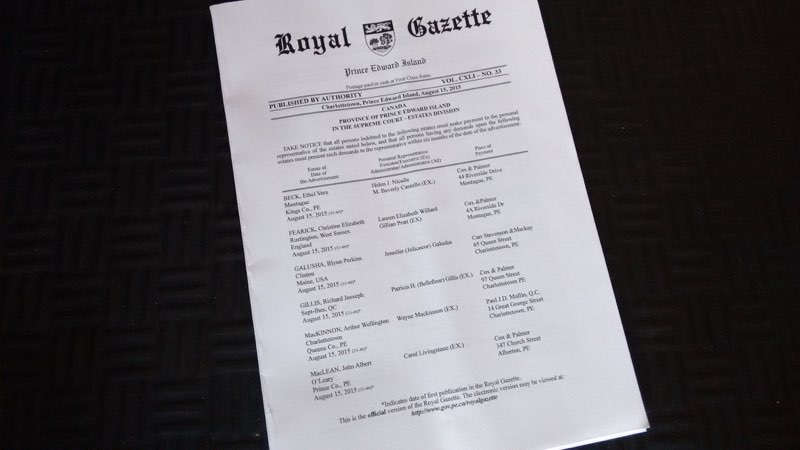
Prosperity, in the limited “is there a place to get good coffee, a good meal, and some interesting people to meet” sense that I use it, is like a roving spotlight that passes over Prince Edward Island, shining on different communities from year to year. To the extent that “the hot new place” is a thing here, every year brings a new “have you been out to…” question that’s asked when you meet people you haven’t seen since the summer started.
When we first landed here 22 years ago, The Dunes was all the rage.
A few years ago it was Tyne Valley that was hot: Seasons in Thyme, and then The Landing were places to go.
Then it was Ritchie Simpson’s fish place out at the shore in Grand Tracadie.
And then the Ship to Shore in Darnley.
This year it seems to be southeastern Kings County where all the action is: between the Murrays, River and Harbour, there are some interesting things happening.
Last weekend Oliver and I set out to explore the hotness of the Murrays, and here’s where our route took us:

After our usual stop at the Charlottetown Farmer’s Market, we headed over the bridge and along Rte. 2 to Orwell, and then diverted off the main highway to make a straight shot for Murray River.
Our first stop was Daidala Antiques & Artisan Market, Savannah Belsher’s new shop in the space formerly occupied by Tales of the Riverbank Books. Savannah has kept the books, and added vinyl records, clothing, paper goods, and all manner of interesting sundries. We emerged with Jane Jacobs’s The Nature of Economies and a copy of Generation Green. And, of course, all the better for being exposed to Savannah’s enthusiastic embrace of her new venture.

Next door to Daidala, in the old River Delight Ice Cream, is Companion Coffee, Steven Fancy’s new espresso stand cum dog park that was about as tailor-made a pit-stop as you could conjure up for a thirsty service-dog-accompanied father and son. If you’d told me a decade ago – or even last year – that I would someday be drinking a macchiato in Murray River I would have looked at you as if you were a strange alien from the future.
But there I was, sitting on a picnic table in the expansive well-fenced-in dog yard in the back, macchiato in hand, smoothie in Oliver’s, with Ethan romping about. Companion not only sells coffee and smoothies, but also ice cream and sandwiches. Steven is a kind, friendly host, and I hope against hope that he’ll make a go of it there, as pushing the espresso envelope out from town is a Herculean task.

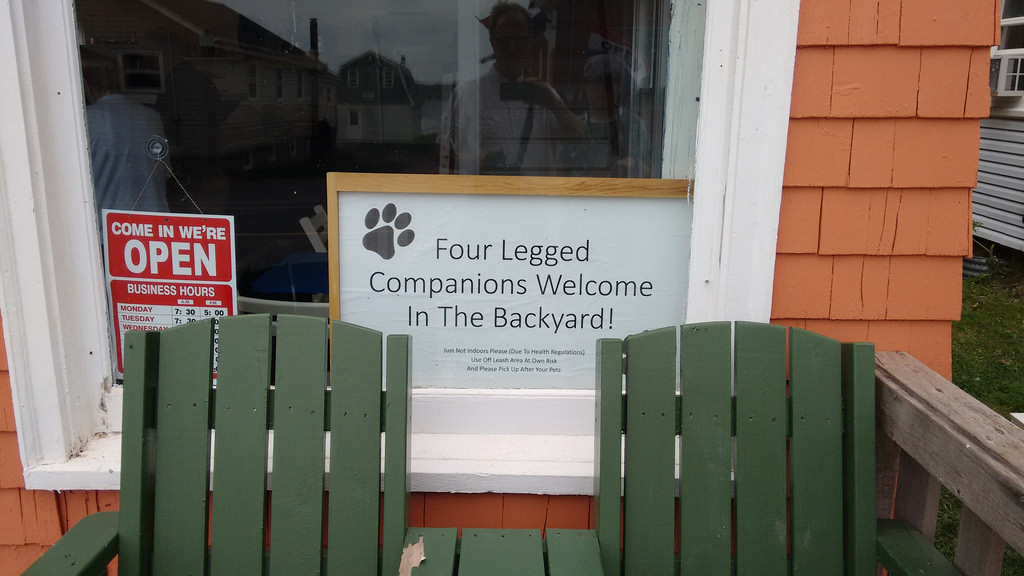
With the hotness of one Murray attended to, we set off up the road to other, to Murray Harbour, where all the talk this summer is about #5, the new restaurant in the old church up on the hill.
Wade Little has transformed the Murray Harbour Presbyterian Church, at #5 Church Street into #5 Café, and when we arrived, midafternoon, it was packed to the gills.
The space it beautiful: bright, solid, whimsical and not at all church-solemn:
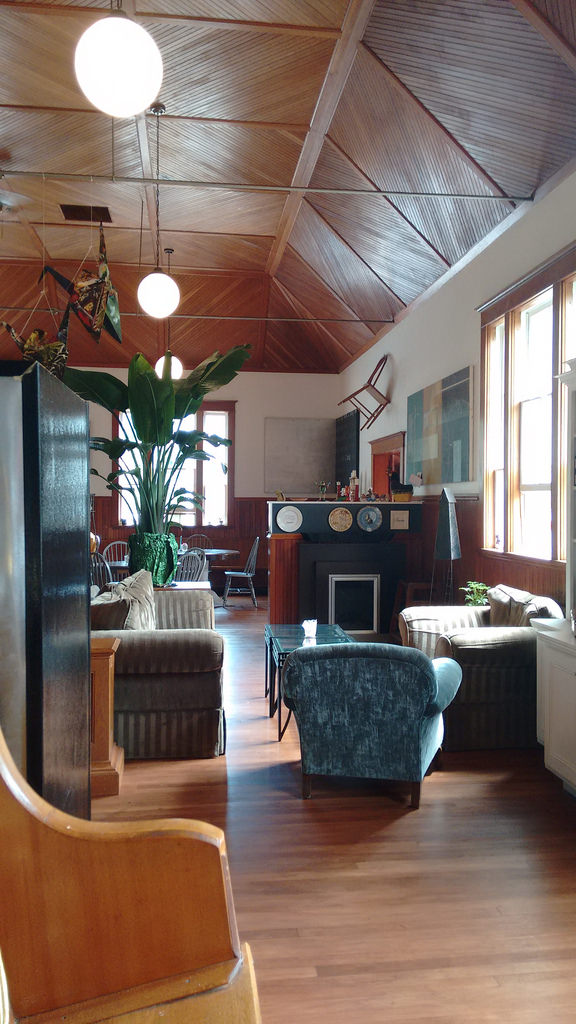
The packed-to-the-gills afternoon was obviously pushing the staff to their limits, and so once we seated ourselves at the sole remaining table it was longer than I would like before the table got cleared and we had menus in our hands. Once menus were in-hand, though, things proceeded at a good clip, and 10 minutes later we had our food: I had the mushrooms on toast, a deceptively simple entrée (toast, with mushrooms on top) that was just lovely; Oliver had a turkey and cheese panini that he wolfed down, so I suspect it too was good. We shared a bowl of spicy french fries; I couldn’t resist the table tent marketing them and they turned out to be almost perfect: hot, crisp, and intriguingly spiced.
Well fed and well-peed (the #5 toilets are a delight in their own right, and are complete with hymnals should you be overtaken mid-ablution), we headed up the road into downtown Murray Harbour and then a hard-left along Westview Drive along the South River to take a look at a plot of land that a friend might be looking to sell. And then it was over the back roads to High Bank and Little Sands and Wood Islands, and home.
So when you’re looking for the new Island hotness this weekend, head south by southeast for a coffee, a Tolstoy and a good meal. You’ll be happy you did.
Thanks to my friend Ann for the pointer to the #5.
Back in April, seemingly on the spur of the moment, [[Catherine]] created a quilted wall hanging for a public event at Trinity United Church to memorialize the many city elm trees that were being cut down due to Dutch Elm disease.
At that same event, Todd E. MacLean both performed a beautiful solo on the sax and delivered a poem he’s composed for the occasion, To the Fallen Elms of Charlottetown.
In the months since then Catherine polished the wall hanging and I set Todd’s poem in type and printed it on fabric on my Golding Jobber № 8 letterpress. Catherine then quilted the poem to the wall hanging.
Printing on fabric turns out to be harder than I thought: not only is it harder than paper to keep in place, but it doesn’t take to the ink in the same way that paper does, resulting an less-even inking that I would like. Nonetheless, I’m happy with the result, and I’m happy that, for the first time (other than [[Oliver]]!), Catherine and I got a chance to collaborate on something.

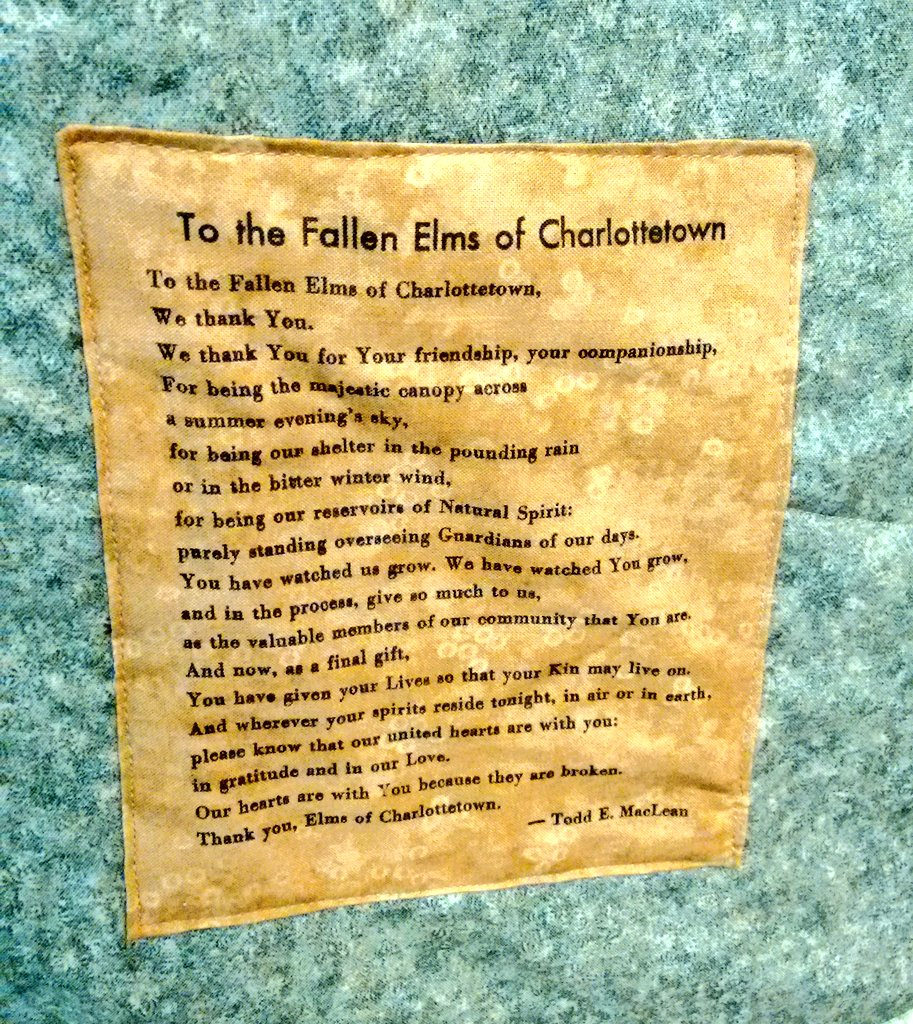
Every day at around 4:00 p.m. I get an email, via IFTTT (IF This Then That, a free web service that glues disparate services on the web together in interesting ways), that contains a digest of the Instagram photos taken in my neighbourhood in the last 24 hours.
The recipe (that’s what IFTTT called “rules for routing stuff from one place to another,” in this case from Instagram to my email) looks like this (you can add it to your own IFTTT account, with your own location, if you like):

And here are thumbnails of the photos that I received today (the actual email from IFTTT contains larger images, with links to the Instagram originals)

Instagram’s method for figuring out where a photo was taken is, to some extent, reliant on the user to identify the location; that’s why there are beach and cliffs photos in the mix,
But, that aside, I find this daily digest provides me with an interesting insight into what people – Instagram-using people, at least – find interesting in the area where I work and live.
(The images above are from the following Instagram users: audreyannej, chloemahar, cohenmcdonald, darinmuck, dmwedge, dong_zheming, everythingeverywhere, factorypei, haleyhbu_, ibaadshah101, ilovemoonsnail, kalkalkal, katkruger, kissthebride1, lauethier, lauradawnclerk, libigatti, lingerietop28, lsquiresiv, madisonmcginniss, mfabaughen, miss_emilysarah, rebelrebelgrrl, ruk, ryan_cheverie, salitabacchi_henry, soxmerry, sreevatsan, taylorgill7, theguildpei, thekettleblackpei, theqasimkhan, timothydanielob, triple7presents, and wallace_katie).
On a technical note, I used the excellent ripMIME utility to decode the MIME email I get from IFTTT into an HTML file, and then ripped the images ouf of that with Firefox to produce the collage about with GraphicConverter.
Remember Dave’s Service Centre, my mechanic of choice?
Well I had the Jetta in the shop there today to replace the pads and rotors on the front brakes – Dave suspects the rotors were the factory-originals, which is pretty amazing given that it’s a 15 year old car.
On the way out of the parking lot after picking up the car I ran into comedy’s Patrick Ledwell on the way in and I made a comment about his having great taste in mechanics.
It turns out that Patrick found Dave through this here blog, which is about as gratifying a result for the world as you can get in the blogging business.
And so I reiterate – again – that if you’ve got a car that needs attention, in Dave’s you will find friendly, talented service at reasonable prices.
Remember those discretionary ligatures I wrote about last week?
Well, with regret, I’ve realized it’s best I stop using them, and so, by changing the settings in the Typogrify module for Drupal that conjured them to life in the first place, they are gone.

I did love them so.
But the problem was that, in using them, I had to pretend that I lived in a typographically perfect universe where all of the ligatures were available in all of the typefaces that might eventually be used to render the text I write here.
But that, alas, is not the case, leading to some ugly rendering when the text left its home here for other pastures.
Let’s say, for example, you copied a paragraph from this post into TextEdit on a Mac to use in your PhD thesis on Goudy, and set the typeface to Bodini; the result would look like this:

Ugh.
Todd Gallant pointed out, on Twitter, the result of the ligatures when the RSS feed of the blog gets rendered by Feedly on a mobile device:

There was another problem, too: browsers aren’t smart enough to do search-in-page search for ligatures-as-their-component-letters. So if I search on a page for “contrast,” for example, and the “st” in the occurrences on the page are rendered as ligatures, then they won’t be found by the browser.

Ugh.
So it’s back to regular old non-ligatured text.
It was fun while it lasted.
It’s August 9. In previous years I was doing all manner of things this week:
- In 2014, I lamented the passing of Ron Boyles
- In 2013, I was just starting out printing coffee bags
- In 2012, I was railing against the privatization of public space
- In 2011, I printed what might be my favourite letterpress job to date, in Berlin
- In 2010, Oliver and I took a trip to Souris to hear Tim Chaisson
- In 2009, I took a boat trip off French River for the first time
- In 2008, it was a summer of endless travel fun
- In 2007, Catherine told me she would go to the beach every day if she could
- In 2006, Karin LaRonde made me iced tea for my lunch
- In 2005, I noted that the CBC had started to run ads on its website
- In 2004, I learned there are 10,000 people buried in the Elm Avenue Cemetery
- In 2003, Ian and Tessa got married
- In 2002, I tried to get the Bank of Montreal to fix its clock
- In 2001, I was singing the praises of MacAusland’s Woollen Mills
- In 2000, I noted that Linda’s Coffee Shop had kicked it up a notch
- In 1999, I was still mostly talking about work here
Which is to say two things:
I’ve been doing this a long time, this writing-on-the-web thing.
And in none of the above was I at all conscious of the fact that summer would soon be over.
So let this serve as your official reminder (we’re going to Richard’s for lunch in Covehead; maybe we’ll see you there?)

In the beginning there was no bicycle rack at all in front of The Guild. So I took a photo of how I parked my bicycle vs. how there was a large expanse of bicycle rack-friendly space a few metres away, and sent it to the City of Charlottetown:

The city, bless its heart, had a spare bicycle rack in its inventory, and a willingness to install it, so less than a month later, a bicycle rack was installed:

Alas there were two issues.
First, and most importantly, the bolts on the rack almost immediately started to wiggle free, leaving the rack to wobble around dangerously.
And also, perhaps only important to my symmetry-obsessed mind, the rack was installed such that bicycles were perpendicular to the pad under the rack, not parallel to it.

The city was alerted.
The bicycle rack disappeared earlier this week.
Oh no!
But then, this morning, it was back!
Firmly bolted to the ground. And comfortably symmetrical.

Thank you to Ramona Doyle, Sustainability Officer, and to the Public Works crew for working together to make this happen.
Using this man_made=surveillance page as a guide, I’ve started to add the new Charlottetown Police Service CCTV cameras to OpenStreetMap. You can see the position of one here.

I’m adding them each with the following tags:
- man_made = surveillance
- name = eWatch Camera
- operator = Charlottetown Police Service
- surveillance = outdoor
- surveillance:type = camera
- surveillance:zone = town
While the cameras don’t render on the main OpenStreetMap slippy map, they do, however, render on the purpose-built osmcamera.tk site, a project that, helpfully, has released its source code.
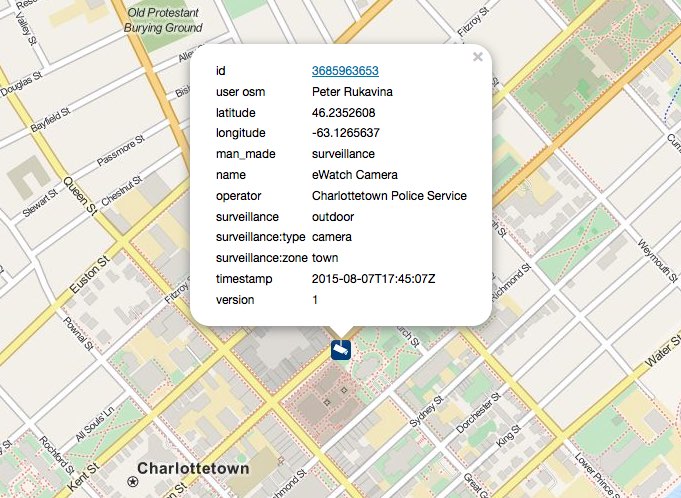
You are welcome to join the effort as new cameras sprout up in your neighbourhood; once we’ve reached a critical mass, perhaps we can create a similar Charlottetown-focused resource.
 I am
I am